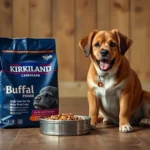
Introduction
When it comes to caring for our furry companions, dog nutrition is a fundamental aspect that can significantly impact their overall health and well-being. Just as humans benefit from a balanced diet, dogs thrive on proper nutrition that meets their specific needs. Among the myriad of snacks available, peanut butter crackers have become a popular choice among pet owners.
You may find yourself wondering if these crunchy treats can be a safe and nutritious option for your dog. After all, who doesn’t love the taste of peanut butter? In this article, we will delve into whether dogs can eat peanut butter crackers and explore their suitability as a part of canine nutrition.
Understanding Dog Nutrition
Importance of Proper Nutrition for Dogs
Proper nutrition is essential for dogs, as it influences their growth, energy levels, and susceptibility to diseases. Nutritional deficiencies can lead to a host of health problems, including obesity, diabetes, and heart disease. Key nutrients that dogs need include:
- Proteins: Crucial for growth, tissue repair, and the production of enzymes and hormones.
- Fats: Provide energy and support cell growth.
- Carbohydrates: Serve as a source of energy and aid in digestion.
- Vitamins: Essential for various bodily functions, including immune response and bone health.
- Minerals: Important for bone health, fluid balance, and nerve function.
Common Dietary Needs by Dog Size and Age
Dogs have different nutritional requirements based on their age and size.
- Puppies require higher levels of protein and fat to support their rapid growth and development.
- Adult dogs need a balanced diet to maintain their health and energy levels.
- Senior dogs often benefit from diets lower in calories but higher in fiber to aid digestion.
Additionally, small, medium, and large breeds have unique needs. For instance, large breeds may be prone to joint issues, necessitating a diet rich in glucosamine, while small breeds may require a higher caloric density.
The Role of Treats in a Dog’s Diet
Benefits of Treats
Treats play a significant role in a dog’s diet, primarily as a tool for positive reinforcement during training sessions. They can also strengthen the bond between a dog and their owner, creating shared experiences and joy.
Treat Guidelines
While treats can be a delightful addition to a dog’s diet, moderation is key. It’s recommended that treats should not exceed 10% of a dog’s daily caloric intake. This helps maintain a balanced diet while preventing weight gain.
Peanut Butter and Dogs
Nutritional Profile of Peanut Butter
Peanut butter is a beloved food among many dogs, and it offers several nutritional benefits. Here’s a breakdown of its macronutrients:
- Fats: High in healthy fats, peanut butter provides a concentrated energy source.
- Proteins: A good source of protein that can aid in muscle development and repair.
- Carbohydrates: Contains some carbohydrates, which provide energy.
In moderation, peanut butter can serve as a healthy treat, offering protein and healthy fats that support a dog’s energy needs.
Potential Risks of Peanut Butter
Despite its benefits, there are potential risks associated with feeding peanut butter to dogs:
- Allergens: Some dogs may be allergic to peanuts, leading to symptoms such as itching, swelling, or gastrointestinal upset.
- Xylitol: Many peanut butter brands contain xylitol, a sugar substitute that is extremely toxic to dogs, causing insulin release and potentially leading to liver failure.
- High Fat Content: Dogs that are prone to pancreatitis or obesity should avoid high-fat foods, including peanut butter, as it can exacerbate these conditions.
Peanut Butter Crackers – Are They Safe?
Ingredients in Peanut Butter Crackers
To determine if dogs can eat peanut butter crackers, it’s essential to analyze their ingredients. Common components of peanut butter crackers typically include:
- Peanut Butter: Can be dog-friendly if free from xylitol.
- Crackers: Often made from wheat flour, which may not be harmful in small amounts but can be problematic for dogs with gluten sensitivities.
- Salt: Excessive salt is not healthy for dogs and can lead to increased thirst and urination.
- Preservatives and Artificial Ingredients: Many commercial snacks contain additives that may not be safe for dogs.
Assessing the Suitability of Peanut Butter Crackers for Dogs
Comparing plain peanut butter to peanut butter crackers reveals significant differences. While plain peanut butter can be a healthy treat in moderation, peanut butter crackers often contain additional ingredients that may not be suitable for dogs.
Potential health implications of feeding peanut butter crackers to dogs include:
- Digestive Issues: The additional ingredients may lead to upset stomachs or diarrhea.
- Weight Gain: The carbohydrate content in crackers can contribute to weight gain if overfed.
Recommendations for Safe Consumption
If you decide to offer your dog peanut butter crackers, consider these recommendations:
- Introduce Slowly: Start with a small piece to see how your dog reacts.
- Monitor for Reactions: Watch for any signs of allergies or digestive upset.
- Portion Control: Limit the number of crackers to avoid excessive calorie intake.
Alternatives to Peanut Butter Crackers
Healthier Treat Options
If you’re looking for healthier alternatives to peanut butter crackers, consider these dog-safe options:
- Homemade Peanut Butter Treats: Made with simple, wholesome ingredients.
- Fruits and Vegetables: Carrots, apples (without seeds), and blueberries can be great snacks.
- Commercial Dog Treats: Look for treats made with natural ingredients and without fillers.
These alternatives not only provide nutrition but can also be lower in calories, making them a better choice for your dog’s health.
DIY Peanut Butter Treat Recipes
Creating your own dog treats is easy and rewarding. Here are two simple recipes:
Peanut Butter Banana Treats
– 1 ripe banana
– 1 cup of peanut butter (ensure it’s xylitol-free)
– 2 cups of oats
Instructions:
1. Preheat the oven to 350°F (175°C).
2. Mash the banana and mix it with peanut butter.
3. Add oats and stir until combined.
4. Scoop spoonfuls onto a baking sheet and flatten slightly.
5. Bake for 15-20 minutes until golden.
Pumpkin Peanut Butter Bites
– 1 cup of pure pumpkin puree
– 1/2 cup of peanut butter
– 2 cups of whole wheat flour
Instructions:
1. Preheat the oven to 350°F (175°C).
2. Mix all ingredients in a bowl until a dough forms.
3. Roll into small balls and place on a baking sheet.
4. Bake for 20-25 minutes.
These recipes provide a nutritious treat without the added preservatives or unhealthy ingredients found in commercial snacks.
Conclusion
In summary, peanut butter crackers can be tempting for dogs, but their safety largely depends on the ingredients used. While peanut butter itself can be a healthy treat in moderation, peanut butter crackers often include additives that may not be beneficial for dogs.
As responsible pet owners, it’s essential to make informed choices regarding our dog’s diet. Always consult with a veterinarian for personalized dietary advice tailored to your dog’s specific needs and health conditions.
FAQs
Can all dogs eat peanut butter?
While many dogs can enjoy peanut butter, some may have allergies or sensitivities. Always check for individual reactions and consult your vet if unsure.
What should I do if my dog eats too many peanut butter crackers?
Monitor your dog for symptoms like vomiting or diarrhea. If your dog shows severe symptoms or distress, contact your veterinarian immediately.
Are there any specific brands of peanut butter that are safest for dogs?
Look for brands that specifically state they are xylitol-free. Natural peanut butter with no added sugars or salts is often the safest option.
How often can I give my dog peanut butter as a treat?
Treats, including peanut butter, should not exceed 10% of your dog’s daily caloric intake. Always practice moderation.









